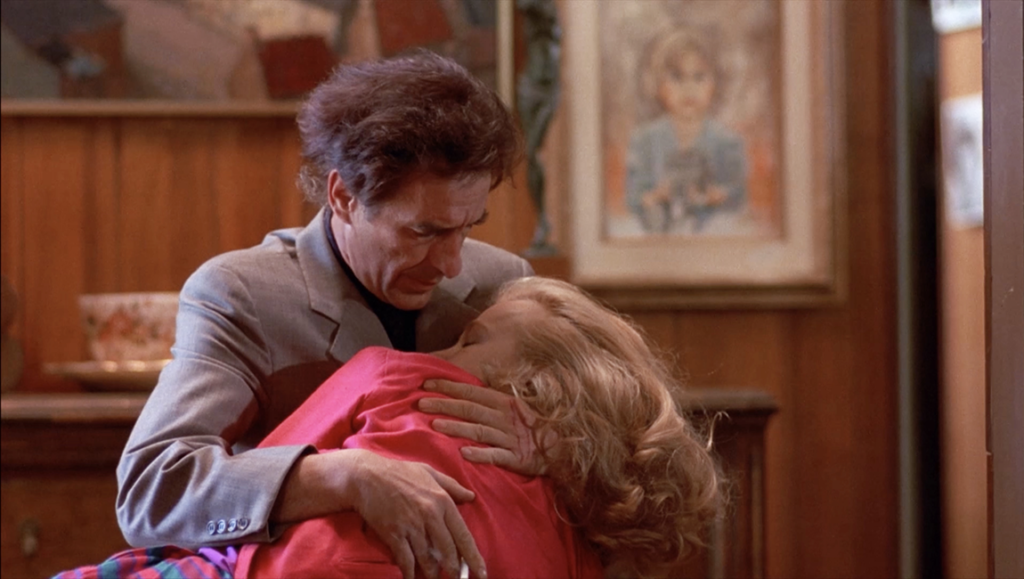Love Streams opens on Robert Harmon (director John Cassavetes), a washed-up novelist living in a nice, old house (the filmmaker’s actual home) interviewing some young sex workers. “Tell me what a good time is,” he prompts one of them. “Cooking,” she says. “Cooking?” She changes her answer to dreaming. He responds: “What do you dream?” Indeed, in many ways, except for his ghostly opus Opening Night, Love Streams is Cassavetes’ most dream-like picture.
As the film begins, Sarah Lawson (Gena Rowlands) and her soon-to-be-ex-husband Jack (Seymour Cassel) are finalizing their divorce, dealing with the custody rights over their daughter, Debbie. Sarah claims that she and Debbie visit funerals and hospitals to cheer people up. “You might say that’s what I do: I visit sick people.” But Sarah, like so many of Rowlands’ other characters, bears maladies of her own; at times, she collapses to the floor, seized by migraines and terror. As a result, Debbie has decided that she wants to stay with her father — she’s had enough of sick people.
Then, we’re back to Robert, whose first wife arrives to drop off their son Albie for a surprise visit. It’s clear that Robert doesn’t know how to relate to the young boy, but we’re soon soon introduced to another shift, as the two opening narratives intersect, and Sarah arrives via taxi cab in the driveway of Robert’s home. They’re elated to see each other, but how do they know one another? “Do you love her?” Albie asks. “Not the way you mean,” Robert says. “Do you kiss her?” “Not the way you mean, I said!”
This is because Robert and Sarah are siblings. The true nature of their relationship remains elusive throughout most of the film, and is revealed later on only casually through dialogue. For viewers, there’s definitely something strange — but uniquely moving — about seeing John and Gena, cinema’s power couple, in their own house, playing brother and sister. When they reunite and she steps through the door, he wraps her in an embrace and laughs, “You’re nuts. You’re a nutty little fruitcake. I love you.”
At one point, the pair discuss art. “Would you consider cooking an art?” she asks him, bringing things back to the questioning nature of the film’s opening. “Would love be considered an art?” Robert concedes that “some people think so.” But, of course, John and Gena surely considered love an art — they were its masters, pouring their hearts out across the canvases of cinema’s big screen. In behind-the-scenes footage of the film’s production, Cassavetes, visibly suffering from the effects of his alcoholism, even states: “That’s all I’m interested in: love.”
Toward the film’s conclusion, its narrative enters the dreams of a sleeping Sarah. We watch her try to make her ex-husband and daughter laugh. We watch her sing on stage, reaching out in futile grasps to grab hold of the family unit once again. In her waking reality, Sarah then finds a use for all her love, filling Robert’s house with a mess of live animals in an attempt to create some companionship for him. Then, a torrential downpour slams down on the estate. Things become strange, and slightly otherworldly, and Cassavetes ends his picture amid a practically Biblical “love stream.” 40 years on, with John and Gena now returned to one another beyond life and death, beyond that great storm of dreams, pain, and love, the stream continues. The power of their art thunders and reverberates to this day.


Comments are closed.